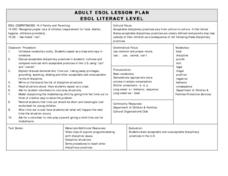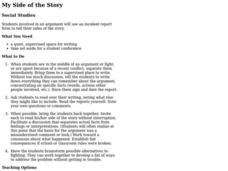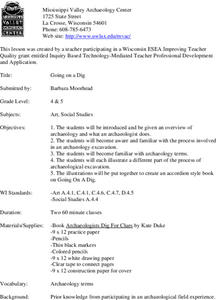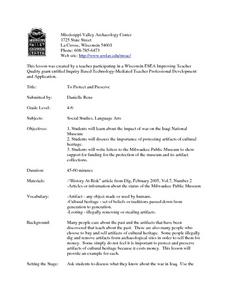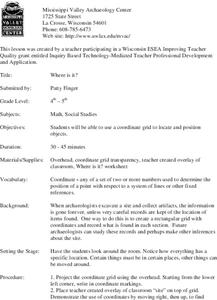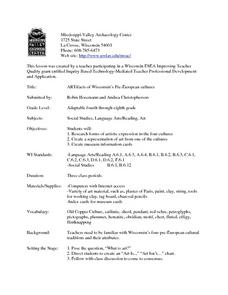Serendip
Homeostasis, Negative Feedback, and Positive Feedback
So many bodily activities depend on homeostasis! Give learners a solid background to understand the basic process of the human body. Scholars first examine negative feedback loops contributing to body temperature regulation and then a...
Curated OER
ESOL Family and Parenting
Sstudents discuss disciplinary options when parenting. They compare and contrast what was acceptable in their native country with what is acceptable in America. They list courses that are available to parents. They write one paragraph...
Curated OER
Linking Population, Health, And Environment
Students evaluate the impact of our lifestyles on the environment and identify indicators of human impact on the environment. They explore the variation in quality of life in selected countries.
Curated OER
Drugs Change the Way Neurons Communicate
Students examine that certain drugs interfere selectively with neurotransmission, and realize that the effect of a drug is dependent upon dosage and route of administration.
Curated OER
How To Find a Site
Fourth graders identify the three basic needs of humans. They identify on a map the best places to live and make a list of items that they can find on a map - streams, river, hills, plains, forests, etc.
Curated OER
Contextual Clues
Students observe and interpret images of artifacts in different contexts in order to recognize importance of leaving artifacts in original context to correctly understand their meaning, and observe what is surrounding object to interpret...
Curated OER
Going on a Dig
Learners study an overview of archaeology and what an archaeologist does. They examine the process involved in an archaeology excavation and illustrate a different part of the process of archaeological excavation.
Curated OER
To Protect and Preserve
Students discuss the impact of war on the Iraqi National Museum and the importance of protecting artifacts of cultural heritage. They write letters to the Milwaukee Public Museum to show support for funding for the protection of the...
Curated OER
How Old Is Mike?
Students examine the absolute dating of fossils, they use a list of names and ages to determine the difference between relative age and absolute age. They explore the relative age and absolute age of people and of fossils.
Curated OER
Archaeological Inquiry
Students describe what they see as they observe an "artifact". They draw conclusions based on the information gathered to identify what the artifact might be used for and determine how old it might be.
Curated OER
Pieces of the Past
Young scholars study the importance of preserving the archaeological record. They write a paragraph describing an object and why it is important to them. They cut their paper into a puzzle and compare their own to the student they trade...
Curated OER
What's Missing?
Students examine their beliefs about archaeological preservation. They articulate a response to archaeological resource destruction. Students then complete two puzzles and relate them to archaeological research.
Curated OER
Preserve is the Word
Students investigate a list of archaeological ethical questions. They select a question/issue and design a 3-minute (maximum) PSA to persuade the public to agree with their idea. They conduct research or interviews with experts to be...
Curated OER
Filling in the Picture
Students study archaeological sites. They discover some of the problems inherent in choosing sites and what parts are chosen for excavation. They evaluate and explain their choices for study and articulate the process of archaeological...
Curated OER
Where is it?
Students use a coordinate grid. They investigate and discuss what caused certain objects to be in specific places. They choose a room in their home to map and place objects in specific locations.
Curated OER
Effigy Mound Activity
Students research effigy mounds of Native people in Wisconsin. They create large models of effigy mounds in a given area based on factual information from their studies and research.
Curated OER
Artifact Identification-What is it?
Students observe an artifact and make an inference about the artifact's purpose. They are going to role-play as archaeologists by using artifacts to hypothesize about the lives of past people.
Curated OER
Prehistoric Indians
Fourth graders identify the four Native American groups of Wisconsin. They compare the four groups through discussion and list the four groups with their tools, food, shelter, and time period.
Curated OER
Artifacts of Wisconsin's Pre-european Cultures
Young scholars research forms of artistic expression in four cultures. They create a representation of art from one of the cultures and create museum information cards. They develop a rubric to evaluate each others work.
Curated OER
Discovering Prehistoric People of Wisconsin
Young scholars list the characteristics of the four main groups of prehistoric people of Wisconsin. They compare the characteristics of the groups of to determine the chronological order of existence in Wisconsin.
Curated OER
What Culture Game?
Students examine artifacts from ancient cultures. They compare the differences and some similarities that may exist . They decide on at least two artifacts per area for each of the three cultures chosen and explore diversity.
Curated OER
Pre History through Modern Day Timeline
Students explore the historical sequence of cultures throughout history. They demonstrate the ability to organize events in chronological order and demonstrate how time is measured and annotated.
National First Ladies' Library
Terrorism and Tolerance
Students define the concepts of terrorism and tolerance using various resources. They examine the concept of stereotype, consider stereotypes often applied to Arabs, Middle Easterners, and Muslims, and attempt to discredit these...
Other popular searches
- Peer Mediation
- Peer Mediation Scenarios
- Mediation Scenarios
- Teaching Peer Mediation
- Peer Mediation Activities
- Conflict Mediation
- Mediation Skills
- Peer Mediation Role Plays
- Mediation Process
- Peer Counseling: Mediation
- Mediation and Arbitration
- Mediation Lesson Plans



